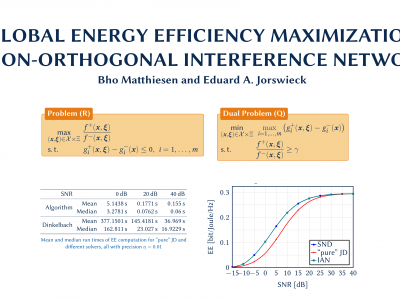Documents
Poster
Global Energy Efficiency Maximization in Non-Orthogonal Interference Networks

- Citation Author(s):
- Submitted by:
- Bho Matthiesen
- Last updated:
- 22 June 2021 - 4:32am
- Document Type:
- Poster
- Document Year:
- 2019
- Event:
- Presenters:
- Bho Matthiesen
- Paper Code:
- 1801
- Categories:
- Keywords:
- Log in to post comments
Energy efficient resource allocation in interference networks is a challenging global optimization problem. The main issue is that the computational complexity grows exponentially in the number of variables. In general, resource allocation in interference networks requires optimizing jointly over achievable rates and transmit powers. However, close scrutiny reveals that the non-convexity stems mostly from the powers while the problem is linear in the rates. Conventional global optimization frameworks treat all variables as non-convex and require complicated, problem specific decomposition approaches to exploit the convexity in some variables. Another issue specific to energy-efficient resource allocation is that these frameworks are unable to deal directly with fractional objectives. The usual approach is to use Dinkelbach's algorithm which requires the solution of a sequence of auxiliary global optimization problems. This increases the computational complexity significantly. To overcome these challenges, we develop an algorithm that inherently treats fractional objectives and differentiates between convex and non-convex variables, preserving the polynomial complexity in the number of convex variables. The numerical results show a speed-up of almost four orders of magnitude over Dinkelbach's algorithm for global fractional programs.

